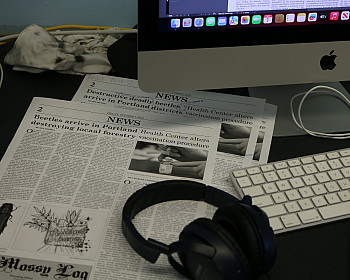Jack Waite
When I visited campus, it was clear that I would be surrounded by intellectually curious people who are motivated to better the world, that I would be supported in my academic endeavors, and that the people seemed happy to be here—it made me want to be a part of it.

Pronouns
Degree and Class Year
Hometown
Current City
Major
Job Title, Organization
Continuing Studies
What three words would you use to describe L&C?
Life After L&C Update
October 2024
What made you want to come to Lewis & Clark?
As a small school whose core values center on curiosity, community, and service, I was naturally driven to Lewis & Clark. When I toured campus, I talked with current students and faculty members, and it was clear to me that I would be surrounded by intellectually curious people who are motivated to better the world. It was also clear that I would be supported in my academic endeavors, whether it be in the form of peer tutoring, research opportunities, or study abroad programs that allowed me to gain experiences outside of my major. What’s more, people at Lewis & Clark seemed happy to be there—it made me want to be a part of it.
What have you been doing since graduation?
Since graduating with a BA in biochemistry and molecular biology, I took some time to teach English as a foreign language in Mexico, but have since started a two-year research fellowship at the National Institutes of Health. My day-to-day is full-time laboratory research. I’m currently investigating mechanisms of gene regulation in the early mouse embryo. My plan is to attend graduate school for a PhD in the biomedical sciences starting in 2026.
Congratulations on being a published coauthor in the peer-reviewed journal PLOS One. Can you tell us about your research with Professor Sharon Torigoe?
As soon as I started as a volunteer in the lab of Dr. Torigoe, I quickly fell in love with the process of scientific research. It was special to not just learn about science, but to actually do science, and Dr. Torigoe did an incredible job of giving me the tools to do so. Throughout my time in the lab, I ended up completing three summer internships, a research practicum course, and a senior honors thesis in the lab. My work aimed at understanding how an important gene is expressed at the right time and place during embryonic development, and involved a wide range of molecular biology techniques, including CRISPR-Cas9 genome editing. This hands-on experience was not only extremely exciting and fulfilling—it has set me up exceedingly well for a career in research, and I’ll forever be grateful to Dr. Torigoe, and the entire Lewis & Clark faculty, for their investment in my personal development.
What impact did your participation in the research have on your post-graduation opportunities? How did it prepare you for life after Lewis & Clark?
By providing me with the hands-on opportunity to do real scientific research, I got a taste of what life is like as a graduate student, motivating my current plan to obtain a PhD. This research opportunity also primed me to think and work like a scientist: I had to get familiar with the most recent literature, troubleshoot things when experiments went awry, collect and interpret data, and learn how to communicate my data to the scientific community. These real-world skills are difficult to teach in a classroom setting, but have proved essential in obtaining and succeeding in my current position at the National Institutes of Health.
What would you say is the most important thing you learned at Lewis & Clark?
The most important thing I learned was not any individual fact or concept, but rather the ability to learn. In the context of my biochemistry major, I was taught how to read scientific papers, get up-to-date on primary literature, present scientific data, and think critically about hypotheses and experiments. These skills have given me the ability and confidence to learn about any area of science, even if I never take a formal class on the subject.
Rogers Summer Science Research, July 2023
Describe what you are researching this summer. What is your exact role?
As a full-time summer research intern, I am studying the ways in which cells have evolved to selectively turn on and off genes under different conditions. This ability, known as gene regulation, has enabled life to develop a wide diversity of structures. But how genes are activated at precisely the right time and place remains mysterious. This summer, I am investigating how one particular cell type—embryonic stem cells—expresses a gene that is key for maintaining pluripotency. I am using genome editing techniques to make mutations to the regions of DNA—known as enhancers—that are thought to regulate this gene.
What’s the best part of this experience?
The best part of this experience has been learning to conduct scientific research independently. I am learning to plan and carry out experiments on my own, think critically about their results, and follow-up with further experiments. The rewarding part is getting to learn about how the world works!
How were you supported in finding and securing this research opportunity?
I was recruited by my current advisor, Dr. Sharon Torigoe. Fortunately, she had read my Lewis & Clark application and saw my potential as a scientist. She then sought me out during my first year. She encouraged me to apply for the John S. Rogers Science Program in 2021, and that’s when I truly began in the lab.
How do you see this experience leading to a career in your chosen field and/or aiding in your career development after L&C?
The Rogers program has given me the ability to experience life as a full-time graduate student. I’ve learned countless experimental techniques, and have a good handle on my area of study, but most importantly, I’ve learned how to adapt, and to think like a scientist. This will be invaluable in a future PhD program that demands me to constantly be learning new things.
More Admissions Stories
Admissions is located in Frank Manor House on the Undergraduate Campus.
MSC: 32
email admissions@lclark.edu
voice 503-768-7040
fax 503-768-7055
Vice President of Admissions and Financial Aid
Eric Staab
Admissions
Lewis & Clark
615 S. Palatine Hill Road
Portland OR 97219


